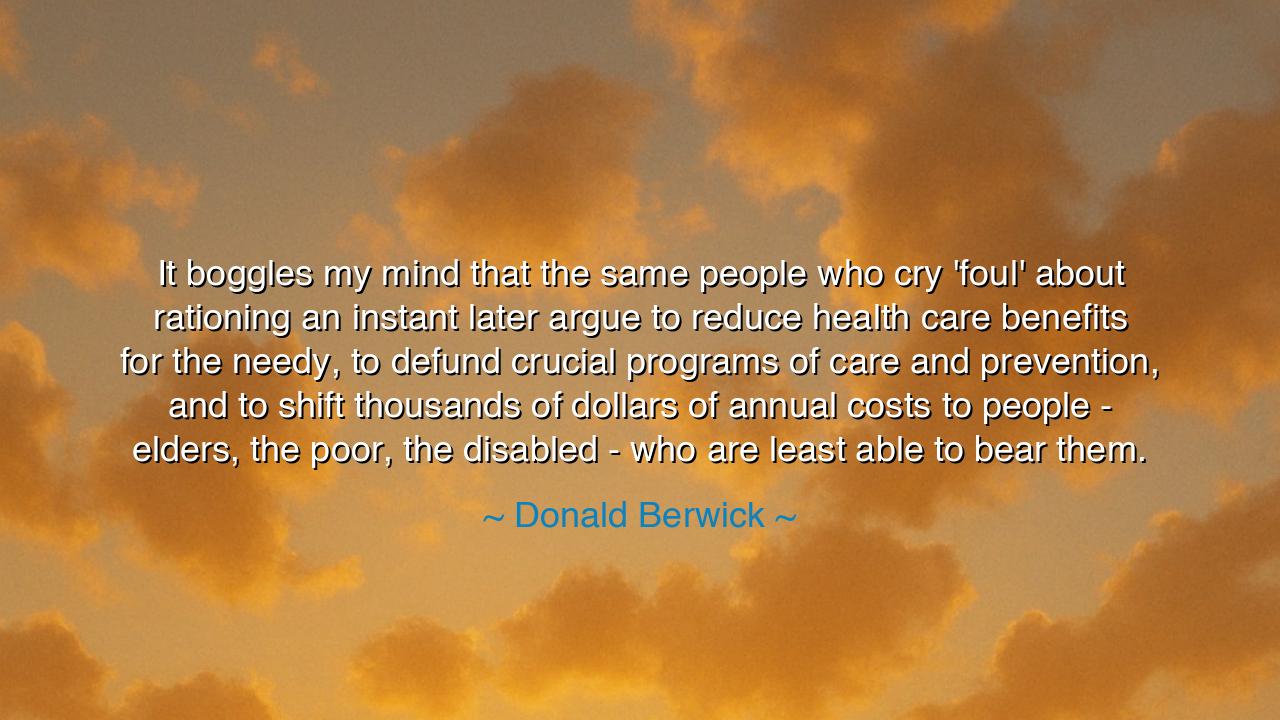
It boggles my mind that the same people who cry 'foul' about
It boggles my mind that the same people who cry 'foul' about rationing an instant later argue to reduce health care benefits for the needy, to defund crucial programs of care and prevention, and to shift thousands of dollars of annual costs to people - elders, the poor, the disabled - who are least able to bear them.






“It boggles my mind that the same people who cry 'foul' about rationing an instant later argue to reduce health care benefits for the needy, to defund crucial programs of care and prevention, and to shift thousands of dollars of annual costs to people—elders, the poor, the disabled—who are least able to bear them.” Thus spoke Donald Berwick, a physician and reformer who has long walked the path of compassion in the field of healing. His words, both searing and sorrowful, strike at the heart of human hypocrisy. In them, he exposes the deep fracture that runs through modern society—the chasm between rhetoric and reality, between what people claim to value and what they truly uphold. Berwick’s lament is not merely about policy; it is about morality. It is a cry for justice, empathy, and coherence in the way humanity chooses to care—or fail to care—for its most vulnerable.
In this statement, Berwick speaks of the contradiction that lies at the root of much public debate. Many decry “rationing,” fearing the loss of choice or freedom in matters of health care, yet these same voices often call for cuts to the very programs that sustain the weak. They denounce limits for themselves, but impose them upon others. This, to Berwick, is a betrayal of the sacred covenant that underlies civilization: that those with strength and means must bear responsibility for those without. His astonishment—the “boggling” of his mind—is not simply intellectual confusion, but moral disbelief, for such reasoning wounds the very fabric of compassion upon which true health depends.
The ancients, too, knew this truth. In the writings of Hippocrates, father of medicine, we find the principle that the healer must serve without prejudice, caring for both the rich and the poor. In the Roman Republic, the philosopher Seneca warned that a society that abandons its weak will soon find its soul diminished. Yet here in our own age, Berwick sees a civilization repeating the same perilous mistake—turning away from the elders who carried its burdens, the poor who labor unseen, and the disabled who depend upon its mercy. What use is progress, he asks implicitly, if the cost is the suffering of those who cannot speak for themselves?
Consider the fate of Florence Nightingale, the “Lady with the Lamp,” who during the Crimean War saw soldiers dying not from wounds, but from neglect. She understood that medicine without compassion is hollow, that healing requires not only skill but heart. She fought the indifference of bureaucrats who counted pennies while lives were lost. Her battle was the same as Berwick’s: to awaken the conscience of the powerful, to remind them that care cannot be measured in profit, nor compassion weighed in gold. Her victory, like his call, was not for herself but for the nameless multitudes who suffer in silence.
Berwick’s message is both a mirror and a challenge. He compels us to see that when we reduce support for the vulnerable under the guise of “efficiency,” we are not merely adjusting budgets—we are diminishing our humanity. A society that refuses to sustain its sick, its aged, its poor, becomes sick in spirit itself. The true measure of civilization is not in its wealth, but in its willingness to share it; not in its strength, but in how it uses that strength to lift others. The ancients called this philia, the brotherly love that binds a people together. When that bond is broken, the empire of the heart collapses, no matter how tall its towers may stand.
And yet, Berwick’s words are not only a condemnation; they are also a summons to action. He reminds us that health care is not a privilege, but a collective responsibility—an act of moral architecture. Each decision we make, each policy we support, either strengthens or weakens the structure of shared wellbeing. To defend care and prevention is to defend life itself. It is to recognize that the wellbeing of the poor safeguards the wellbeing of the whole. For disease, despair, and inequality do not remain confined—they spread, as surely as any contagion, until they poison the entire body of society.
So, my child, learn from this truth and let it guide your steps: compassion must be consistent, not convenient. Do not speak of fairness while turning your gaze from suffering. Do not cry against “rationing” for yourself while rationing mercy for others. Instead, let your strength become a shelter for the weak, your prosperity a seed of healing. Support the programs that uplift the forgotten; stand for justice in the councils of the powerful; give freely to those who cannot repay you. For in doing so, you align with the eternal law written in every heart—that the health of one is bound to the health of all.
And thus let Donald Berwick’s words endure as both warning and wisdom: that the measure of a people is not in the wealth it guards, but in the compassion it gives. When we learn to see in the face of every elder, every poor man, every wounded soul, a reflection of our own fragile humanity, then—and only then—shall we become whole. For a civilization that heals its weakest is one that heals itself, and in that healing lies the true health of the world.






AAdministratorAdministrator
Welcome, honored guests. Please leave a comment, we will respond soon